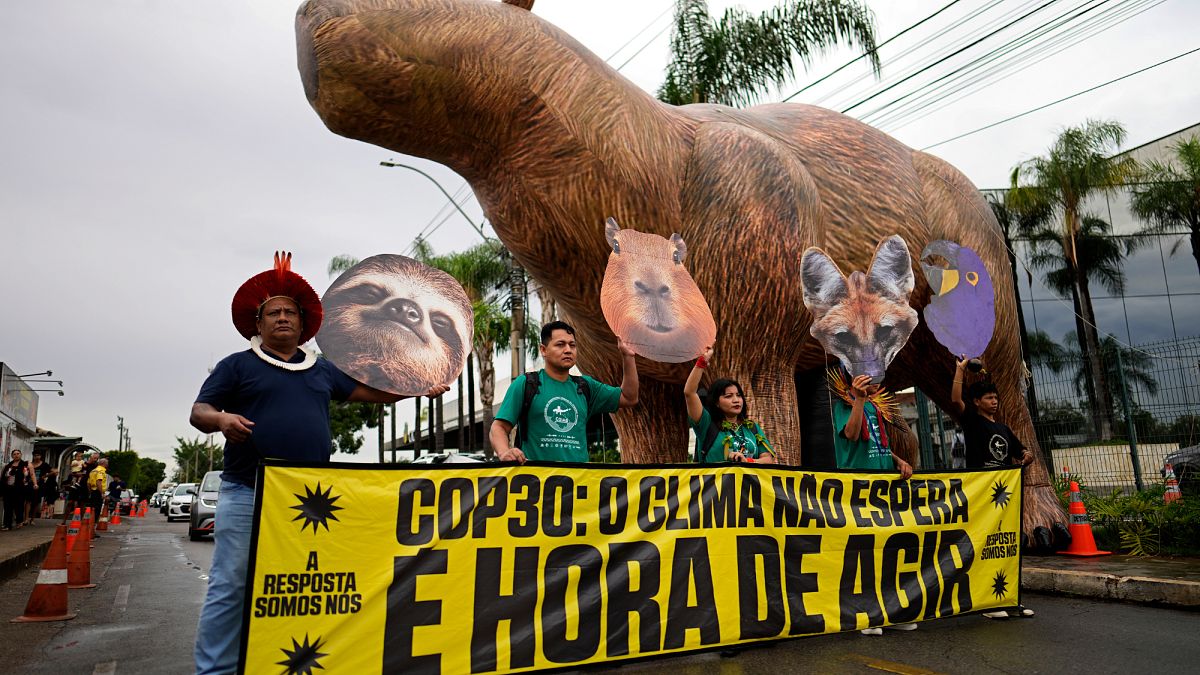Politics
Indigenous Protesters Rally in Brazil for Land Rights Recognition

Hundreds of Indigenous protesters gathered in Brasília, Brazil’s capital, to demand formal recognition of their land rights. The demonstration, organized by the Articulation of Indigenous Peoples of Brazil (APIB), is a key event in the Indigenous Pre-COP agenda ahead of major climate discussions. Protesters are advocating for the urgent demarcation of their territories, which they argue is crucial for Brazil’s climate legacy.
According to organizers, there are currently 37 Indigenous territories that are pending decisions from the Ministry of Justice, while 67 additional territories await the signature of the president. Indigenous leaders highlighted that securing legal recognition for their lands is not only a fundamental human rights issue but also a significant climate strategy. Studies indicate that Indigenous territories are effective in resisting deforestation, making them vital to environmental preservation.
“We know that the center of the discussion today is climate. And research says that the majority of environmental preservation is within Indigenous areas,” stated Amarildo Macuxi, a representative from the Macuxi Indigenous group in Roraima. His comments reflect a growing recognition that Indigenous stewardship of land plays a critical role in combating climate change.
The protest underscores a broader movement among Indigenous peoples in Brazil, who seek to assert their rights and protect their ancestral lands. As the Brazilian government prepares for international climate commitments, these activists are ensuring that their voices and concerns are heard. They argue that without recognizing their land rights, any climate initiatives will be incomplete and ineffective.
This demonstration comes at a pivotal moment, as Brazil faces increasing pressure to enhance its environmental policies. The relationship between land rights and climate action is gaining traction, with Indigenous territories often cited as models of sustainable land management. In this context, the protesters’ call for land recognition resonates not only with Indigenous rights advocates but also with climate scientists and environmental organizations worldwide.
As discussions advance towards the COP summit, the Indigenous groups are poised to continue their advocacy. They aim to ensure that their rights and the significance of their territories are central to Brazil’s climate strategy. The outcome of these efforts could influence not only national policies but also set a precedent for Indigenous rights globally as climate change remains a pressing issue on the international agenda.
The alignment of environmental preservation with Indigenous rights presents a unique opportunity for Brazil to showcase a model of sustainable development that respects and integrates Indigenous knowledge and practices. As the world watches, the actions taken by the Brazilian government in response to these demands will be closely scrutinized.
In summary, the rally in Brasília serves as a significant reminder of the intersection between Indigenous rights and climate action, reinforcing the urgent need for recognition and action on both fronts.
-

 Top Stories3 months ago
Top Stories3 months agoTributes Surge for 9-Year-Old Leon Briody After Cancer Battle
-

 Entertainment4 months ago
Entertainment4 months agoAimee Osbourne Joins Family for Emotional Tribute to Ozzy
-

 Politics4 months ago
Politics4 months agoDanny Healy-Rae Considers Complaint After Altercation with Garda
-

 Top Stories4 months ago
Top Stories4 months agoIreland Enjoys Summer Heat as Hurricane Erin Approaches Atlantic
-

 World5 months ago
World5 months agoHawaii Commemorates 80 Years Since Hiroshima Bombing with Ceremony
-

 Top Stories3 months ago
Top Stories3 months agoNewcastle West Woman Patricia Foley Found Safe After Urgent Search
-

 Top Stories5 months ago
Top Stories5 months agoFianna Fáil TDs Urgently Consider Maire Geoghegan-Quinn for Presidency
-

 World5 months ago
World5 months agoCouple Convicted of Murdering Two-Year-Old Grandson in Wales
-

 World5 months ago
World5 months agoGaza Aid Distribution Tragedy: 20 Killed Amid Ongoing Violence
-

 World5 months ago
World5 months agoAristocrat Constance Marten and Partner Convicted of Infant Murder
-

 Top Stories4 months ago
Top Stories4 months agoClimbing Errigal: A Must-Do Summer Adventure in Donegal
-

 Top Stories4 months ago
Top Stories4 months agoHike Donegal’s Errigal Mountain NOW for Unforgettable Summer Views









